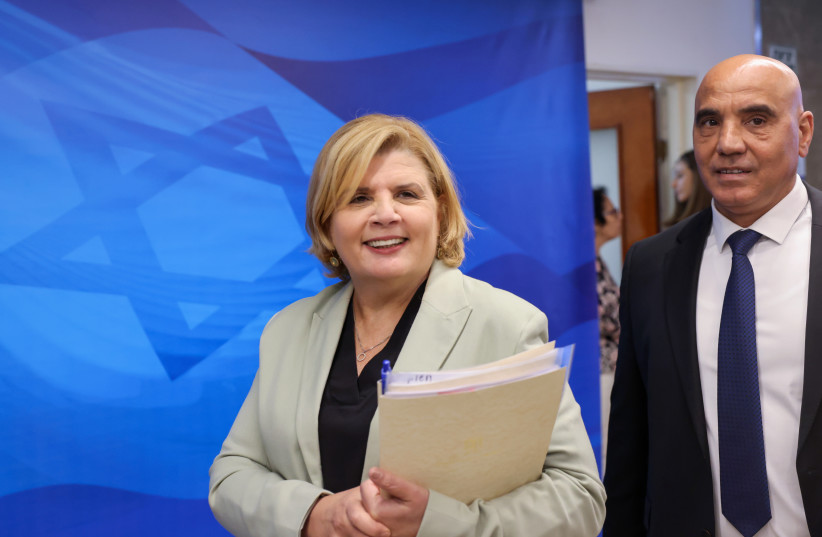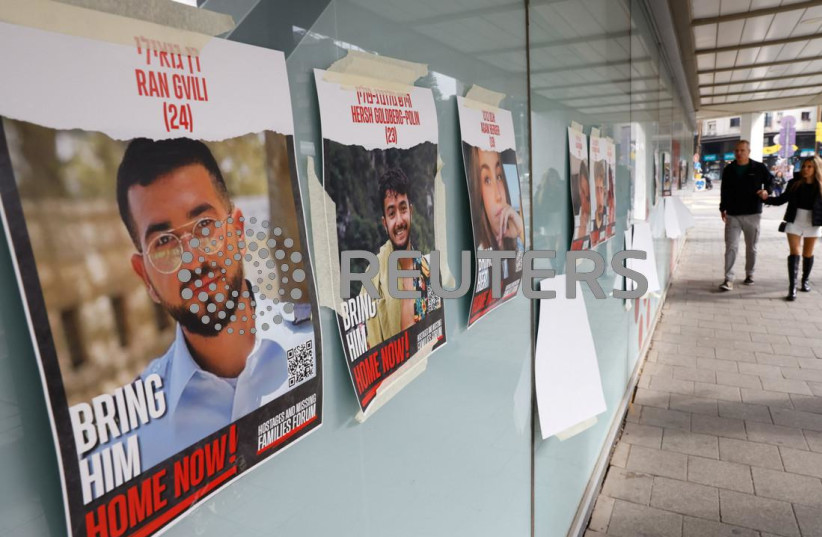Women did not do as well as anticipated in the municipal elections. There were some victories but not nearly enough to indicate that equality has finally arrived in the political arena. The only woman who succeeded beyond all others is Miriam Feirberg-Ikar who, in 1998, became the first female to be elected mayor of Netanya and has won every municipal election since.
Orna Barbivai, who it seemed might defeat the incumbent and legendary mayor of Tel Aviv, Ron Huldai, did well, but not well enough, and Huldai, 79, is set to serve his sixth term. Huldai is an example of someone who is sufficiently popular to be elected time and again as mayor but not to become a member of the Knesset. At the end of December 2020, Huldai launched a new center-left party that he named The Israelis. Had it succeeded, Huldai would have kissed local politics goodbye and taken a seat in the Knesset. But it failed to attract a following, and Huldai retained his office in Tel Aviv’s City Hall.
The victory of Jerusalem Mayor Moshe Lion was expected, albeit not by such a landslide. Curiously, Lion is a mayor virtually without a party. His aim, he said in a radio interview on the day after the elections, was to build a wall-to-wall coalition to ensure consensus over the city’s future.
It had been hoped in certain quarters that the municipal council would finally have an Arab resident among its members – but that did not eventuate. Nazareth-born Sondos Alhut, the first Arab woman running for city council is a young, charismatic, educator who has been living in the capital for several years, originally in east Jerusalem and now in a predominantly Jewish neighborhood, has a strong desire to improve the quality of life for the Arab population. She resisted pressure from many sides to withdraw from the race. Saying that she was unafraid of threats, she pledged to continue and kept her word – but the Arab population did not stand behind her, and she received very few votes. A Jewish voter at one of her parlor meetings, while impressed by her, hinted that she would not be successful in these elections. He told her that while he was interested and involved in politics, he had never heard of her, which meant that she had not done her campaign homework. But he also told her not to be disillusioned. Pointing out that she was young and now had five more years to make herself known and learn the art of campaigning, he gave her hope for her next attempt. There is something ludicrous in the fact that Arabs are not represented on the municipal council when the ratio of Arabs in the total population of the capital is well over 30%.

Questions of a ceasefire
Even though presidents and senior government members of numerous countries have come on solidarity visits to Israel and have been shocked when seeing the damage wrought by Hamas, and videos of the atrocities committed by Hamas, political relations with some countries have soured in the wake of the high death toll and the lack of food, water, and shelter in Gaza. This has prompted requests from many countries for a ceasefire. Israel has refused, saying that until Hamas is defeated and all the hostages are returned, be they living or dead, the war will continue. The trouble is that the world is inclined to pay attention to numbers over facts on the ground.
Initial widespread sympathy for Israel has gradually shifted to Gaza, as the number of Gazan casualties reported continues to increase, as does the need for humanitarian aid. The world ignores the fact that weapons and radically anti-Israel literature have been found in caches in most houses in Gaza – even in the bedrooms of infants.
The leaders of most European countries have called for a ceasefire and are currently dealing with the war between Russia and Ukraine, as well as the one between Israel and Hamas. How the latter war affects European Union-Israel relations will be discussed by the European Forum at the Hebrew University in collaboration with the European Association for the Study of European Integration. Speakers at the round-table discussion in Room 42605 in the HU Faculty of Humanities at 6.30 p.m. on Wednesday, March 6, will include Prof. Guy Harpaz of the Hebrew University’s Law Faculty and Department of International Relations; Dr. Daniel Wajner and Dr. Maya Sion-Tzidkiyahu, both of the European Forum and the HU’s Department of International Relations. The moderator will be Prof. Gisela Dachs of the European Forum. The keynote speaker will be Christine Cassiers, political officer at the EU Delegation in Israel. Discussion will center on the challenges and implications of the war in Gaza.
New appointment at the National Transplant Center
There's certainly a lot of variety in the career of Prof. Shlomo Mor Yosef whose most recent appointment is to chair of the steering committee of the National Transplant Center. Mor Yosef rose to national attention in 2006 when, as director general of the Hadassah Medical Center, he was interviewed several times a day by local and foreign media reporters on the health of then-prime minister Ariel Sharon during his hospitalization following his collapse from a stroke in December 2006.
A specialist in obstetrics and gynecology before he became an administrator, Mor Yosef has since served as director general of the National Insurance Institute, director general of the Population and Immigration Authority, and chairman of the Board of Leumit Health Services.
Mor Yosef succeeds Prof. Rafi Biar who served as the Center’s policy leader in promoting organ donations and transplants. During Biar’s 14 years of transplant service, priorities were determined regarding the list of people awaiting transplants, as well as the utilization of organs harvested without a beating heart. Mor Yosef’s appointment was announced by Health Minister Uriel Bosso, who noted his experience, and skills in various fields of activity. In response, Mor Yosef noted that he was assuming a uniquely significant position and promised to do his utmost to promote the importance of organ transplants. Biar commended the endless dedication of all the medical teams associated with the National Transplant Center headed by Dr. Tamar Ashkenazi in helping to create an excellent system for organ transplants in Israel.
New types of tourism in Israel
While group solidarity visits to Israel are greatly appreciated, it’s sad to think that this will be the main source of incoming tourism over the summer as evacuees gradually move out of hotels and return to their homes. Nevertheless, it is essential that people in many countries realize that Hamas is a terror organization determined in the long run to rule the world. That particular ambition makes it comparable to the Third Reich.
An important visit last week came in the shape of a group of British broadcasters, organized by the UK’s National Jewish Assembly. Among the participants was well-known media and political commentator Lois Perry, who appears regularly on GB News and TalkTV.
Perry has been spearheading the climate realism organization, Car26.org, for the past two years. As someone deeply invested in understanding Jewish culture, Perry was eager to be a first-hand witness to the rich tapestry of Israeli society. Her experience enabled her to understand the enormity of Israel’s military sacrifice in maintaining national security. As a practicing member of the High Church of England, Perry also visited Christian holy sites.
Another participant was TalkTV Broadcaster Andre Walker who said: “At a time when freedom is under attack, it is vital we understand what is going on in Israel. My hope is that we can all learn from this counter-terrorism operation, to ensure it never has to happen again.”

Gary Mond, chairman and founder of the National Jewish Assembly, said that bringing prominent members of the press to Israel represents a unique opportunity to foster greater understanding and appreciation for Israel’s heritage, diverse communities, and unwavering resilience: “By facilitating firsthand experiences and open dialogue, we hope to bridge cultural divides and promote mutual understanding between the United Kingdom and Israel.”
New exhibit highlights hostages held in Gaza
Although Israelis have experienced an overdose of news, features, and op-eds about October 7 and its aftermath, interest continues for as long as the hostages remain in captivity and the war goes on. This was evident last month at the opening of the October 7 exhibition in the ANU Museum of the Jewish People, where the works of 25 artists reflecting various interpretations of the situation were exhibited.
Among the artists represented in the exhibition are residents of the kibbutzim and other areas of the South that were attacked by Hamas, hostages, and people who were murdered or who fell in battle while fighting Hamas.
As is invariably the case, members of the Friends of the Museum headed by attorney Yehuda Raveh and his wife Tami, along with Dan Lahat, Etty and Gad Propper, Ruth and Menachem Oren, Omer Rogovin and Rina Meshel Grunis were present at the opening, along with many others.
greerfc@gmail.com
